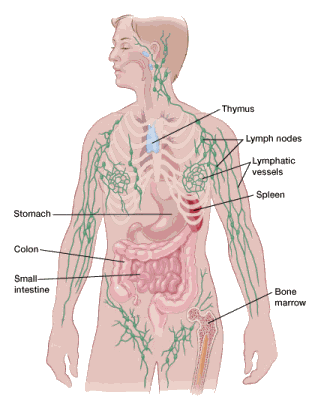Our bodies have a network of lymph vessels and lymph nodes. (Lymph is pronounced limf.) This network is a part of the body’s immune system. It collects fluid, waste material, and other things (like viruses and bacteria) that are in the body tissues, outside the bloodstream.
Lymph vessels are a lot like the veins that collect and carry blood through the body. But instead of carrying blood, these vessels carry the clear watery fluid called lymph.
Lymph fluid flows out from capillary walls to bathe the body’s tissue cells. It carries oxygen and other nutrients to the cells, and carries away waste products like carbon dioxide (CO2) that flow out of the cells. Lymph fluid also contains white blood cells, which help fight infections.
Lymph fluid would build up and cause swelling if it were not drained in some way. That’s the role of the lymph vessels. Lymph vessels draw up the lymph fluid from around the cells to send it towards the chest. There, lymph fluid collects into a large vessel that drains into a blood vessel near the heart.
Lymph nodes and what they do
Lymph vessels route lymph fluid through nodes throughout the body. Lymph nodes are small structures that work as filters for harmful substances. They contain immune cells that can help fight infection by attacking and destroying germs that are carried in through the lymph fluid.
There are hundreds of lymph nodes throughout the body. Each lymph node filters the fluid and substances picked up by the vessels that lead to it. Lymph fluid from the fingers, for instance, works its way toward the chest, joining fluid from the arm. This fluid may filter through lymph nodes at the elbow, or those under the arm. Fluid from the head, scalp, and face flows down through lymph nodes in the neck. Some lymph nodes are deep inside the body, such as between the lungs or around the bowel, to filter fluid in those areas. The lymph fluid slowly flows in from all around the body, making its way back to the chest. At the end of its journey, the filtered fluid, salts, and proteins are dumped back into the bloodstream.
Swollen lymph nodes
When there’s a problem, such as infection, injury, or cancer, the node or the group of lymph nodes in that area may swell or enlarge as they work to filter out the “bad” cells. This may be called lymphadenopathy (LIMF-ad-uh-NOP-uh-thee). Swollen lymph nodes tell you that something is not right, but other symptoms help pinpoint the problem. For instance, ear pain, fever, and enlarged lymph nodes near your ear are clues that you may have an ear infection or cold.
Some areas where lymph nodes commonly swell are in the neck, groin, and underarms. In most cases, only one area of nodes swells at a time. When more than one area of lymph nodes is swollen it’s called generalized lymphadenopathy. Some infections (such as strep throat and chicken pox), certain medicines, immune system diseases, and cancers like lymphoma and leukemia can cause this kind of swelling. The health care provider will look for more information to figure out the cause of the swelling. Lymph node swelling is often caused by something other than cancer.
FULL ARTICLE AT AMERICAN CANCER SOCIETY


Thank you for sharing this information.
ReplyDeleteYou can also take Inlife Super Antioxidants Tablet: Antioxidant-rich formula helps the body to fight against free radicals, optimizes resistance power and boosts the overall immune system.